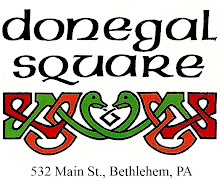Dear Angus,
What is the difference between Gaelic and Erse? I’m curious about what I do not understand.
Thank you,
-PLEASE NOTE THAT MY E-MAIL ADDRESS HAS CHANGED
Dear Changed,
Weel, to explain the difference between Gaelic and Erse ye’ll be needin a bit o’ a convoluted explanation involving the development of languages in the British Isles.
Ye see ma dear, before English began the people inhabiting the British Isles didna spake English, but different Celtic languages. The modern forms of these languages are Welsh, Scots Gaelic, Irish, and Breton, as well as the dead languages of Cornish and Manx. These Celtic languages are grouped inta three different subfamilies, ye ken? And one of the groups is Giodelic (the other two being Continental and Brythonic), to which Irish (also called Irish Gaelic), Scots Gaelic, and Manx belong.
All the modern Giodelic tongues are descendants of the ancient Celtic speech of Ireland, Gaelic. Gaelic began to reach Scotland in the late 5th century A.D., when it was brought by the Irish invaders, and in Scotland the Gaelic language was called “Irish” or “Erse” (different spellings of the same word). For a time the only language on the British Isles was Gaelic, and there was no difference between Irish Gaelic and Scottish Gaelic. However, the Norsemen (Vikings) and Saxons invaded and migrated to Britain from Europe bringing their Germanic languages. The varieties from this mixture of Gaelic and Norse in England came ta be called “English” and in Scotland they came ta be known as “Scots” around the 13th century. So, a chief difference between Scots Gaelic and Irish Gaelic results from the substantial Norse influence on the former, d’ye see?
And so to answer ye’re question, the term Erse is used as a synonym for Irish and sometimes even for Scots Gaelic, and the difference between the two is that Erse is defined as the Goidelic language of Ireland, ye see, while Gaelic is considered to be the Giodelic language of Scotland. Hope this was some help t’ye, and if’n ye’re interested in learning more about Gaelic, sign up for the Gaelic language classes sponsored by the Celtic Cultural Alliance.
ANGUS
Wednesday, March 7
What is the difference between Gaelic and Erse?
Labels:
Breton,
British Isles,
Brythonic,
Continental,
Cornish,
difference,
Erse,
Gaelic,
Giodelic,
Irish,
language,
Manx,
Scots Gaelic,
Welsh
Subscribe to:
Post Comments (Atom)


No comments:
Post a Comment